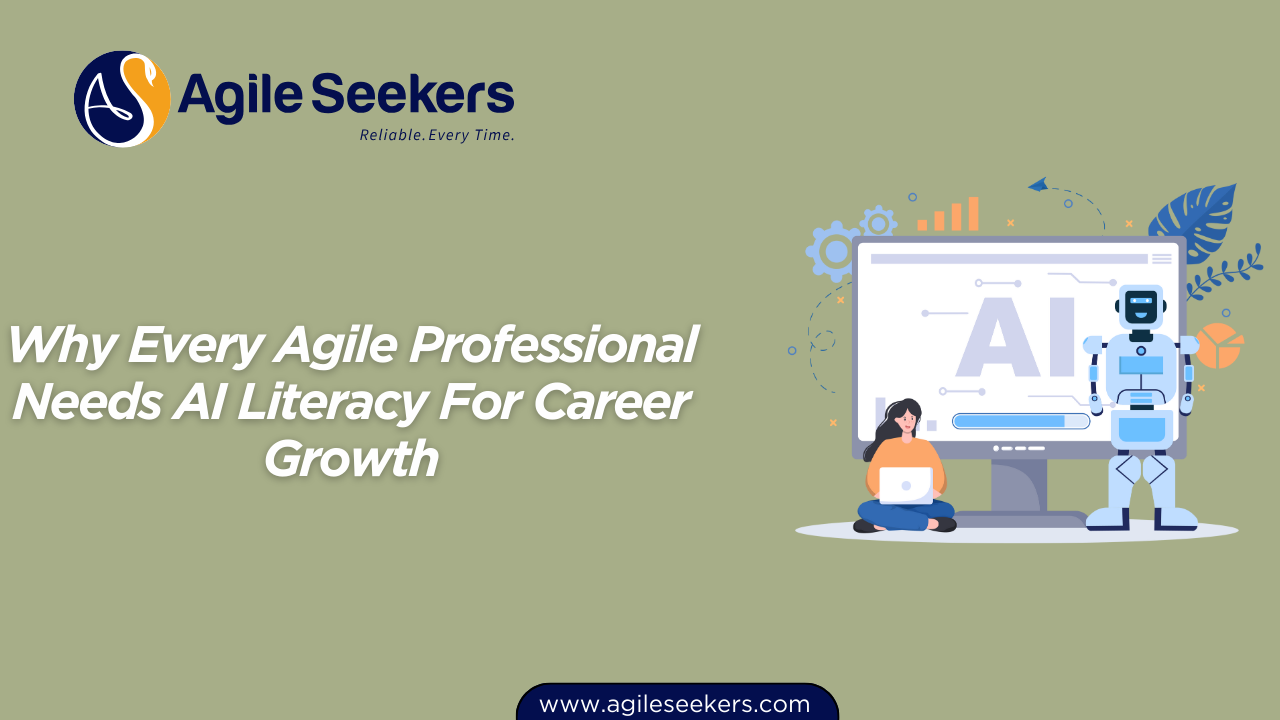Why Every Agile Professional Needs AI Literacy For Career Growth

Artificial Intelligence (AI) is no longer a niche skill. It has become a workplace standard, especially in roles tied to agility, collaboration, and continuous delivery. For Agile professionals, Scrum Masters, Product Owners, Project Managers, and Leaders, AI literacy is moving from optional to essential. If you’re building a career in Agile, the ability to understand and apply AI is one of the strongest differentiators you can develop.
Let’s break down why.
AI Literacy: More Than Just Knowing the Tools
AI literacy is not about becoming a data scientist. It’s about:
-
Understanding how AI collects, processes, and interprets data.
-
Knowing the boundaries and risks of AI-driven decisions.
-
Using AI to enhance collaboration, decision-making, and value delivery.
Think of it like learning how to read financial reports. You don’t have to be an accountant, but you need to understand what the numbers mean. Similarly, Agile professionals need to grasp how AI models provide insights, so they can translate them into better backlog decisions, faster risk responses, and smarter team facilitation.
Why Agile Roles Can’t Ignore AI Anymore
1. Product Owners: Shaping Value with AI Insights
Product Owners are the custodians of value. AI tools help analyze customer feedback, market data, and usage behavior to spot trends. Instead of relying on assumptions, you can prioritize backlogs based on evidence. For example, AI can highlight which features are driving the most engagement or predict churn risks before they appear.
Learning AI for Product Owners equips professionals to interpret these signals and turn them into actionable backlog items.
2. Scrum Masters: Coaching with Data-Driven Clarity
Scrum Masters thrive when they can remove impediments early and help teams improve. AI tools can scan sprint data to detect bottlenecks, flag communication gaps, or even predict burnout risks. This allows Scrum Masters to bring tangible insights into retrospectives instead of relying purely on anecdotal observations.
Building AI skills for Scrum Masters means you can guide teams with facts, improve psychological safety, and coach with confidence.
3. Project Managers: Balancing Scope, Time, and Cost
Project Managers often juggle competing demands: deadlines, budgets, and stakeholder expectations. AI-powered dashboards make it possible to simulate project outcomes, model different resource allocations, and visualize risks before they escalate.
With AI for Project Managers, professionals can manage projects with predictive intelligence, making scope-time-cost trade-offs more transparent and data-backed.
4. Agile Leaders and Change Agents: Driving Transformation with AI Narratives
Agile leaders and change agents need influence. Data-driven storytelling is one of the most powerful ways to gain alignment across an organization. AI helps leaders craft narratives backed by real-time metrics, trend analysis, and outcome forecasting.
By pursuing AI for Agile Leaders and Change Agents, leaders can not only advocate for change but prove its value with evidence.
The Career Growth Angle: Why AI Skills Pay Off
Here’s what AI literacy translates into for your career:
-
Competitive Differentiation: Agile professionals who understand AI stand out in hiring markets where most resumes look the same.
-
Higher Earning Potential: Roles that combine domain expertise with AI skills are consistently placed in higher salary brackets.
-
Cross-Role Flexibility: Whether you’re a Scrum Master moving toward Product Management, or a Project Manager stepping into strategic leadership, AI knowledge transfers across roles.
-
Future-Proofing: As organizations embed AI into their operating models, professionals without AI literacy risk becoming obsolete.
External research supports this. A recent McKinsey report highlighted that AI adoption is scaling across industries, and professionals who adapt to AI tools report stronger career resilience. Harvard Business Review also notes that leaders fluent in AI gain an edge in making complex business decisions.
Practical Scenarios Where AI Literacy Creates Impact
Let’s look at situations Agile professionals face every day—and how AI helps:
-
Backlog Refinement: AI tools can analyze customer reviews, support tickets, and usage data to suggest backlog priorities.
-
Sprint Planning: Predictive AI models can recommend workload balancing based on historical team velocity.
-
Risk Management: AI-driven simulations can forecast potential delivery delays and financial impacts.
-
Stakeholder Communication: Natural language AI can help craft clear, concise updates tailored to different audiences.
-
Retrospectives: AI insights can highlight recurring bottlenecks, enabling data-driven improvements.
Building AI Literacy Without Overwhelm
You don’t need to become an AI engineer to stay relevant. Start small:
-
Learn the Basics: Understand what AI can and cannot do.
-
Experiment with Tools: Try AI-enabled backlog refinement, risk dashboards, or predictive analytics in your current projects.
-
Invest in Certification: Structured learning accelerates adoption. AgileSeekers’ AI-focused certifications provide role-specific depth without unnecessary technical complexity.
-
Stay Curious: Follow trusted sources like MIT Technology Review to stay updated on AI’s role in workplaces.
Conclusion: AI Literacy is the New Agile Literacy
Agility is about adapting to change and delivering value quickly. AI is the biggest change driver shaping how organizations operate. Agile professionals who embrace AI literacy will not just survive, they’ll thrive. They’ll become the go-to professionals for guiding teams, influencing leaders, and delivering outcomes that matter.
If you’re serious about career growth, start building AI literacy today. The future belongs to professionals who can connect Agile practices with AI-powered insights.
Also read - Building Long Term Transformation Strategies With AI Support
Also see - Top 7 Ways Agile Leaders Can Use AI To Drive Cultural Adoption




















